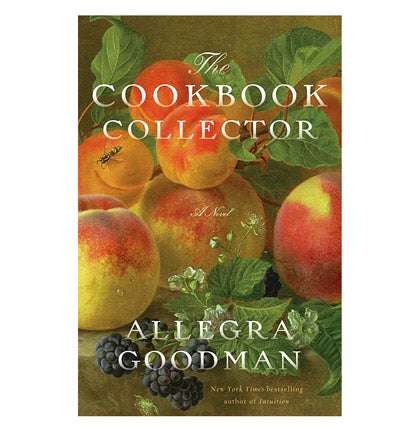The Cookbook Collector, By Allegra Goodman
A sisters' story that's big enough to take on its literary forefathers

Your support helps us to tell the story
From reproductive rights to climate change to Big Tech, The Independent is on the ground when the story is developing. Whether it's investigating the financials of Elon Musk's pro-Trump PAC or producing our latest documentary, 'The A Word', which shines a light on the American women fighting for reproductive rights, we know how important it is to parse out the facts from the messaging.
At such a critical moment in US history, we need reporters on the ground. Your donation allows us to keep sending journalists to speak to both sides of the story.
The Independent is trusted by Americans across the entire political spectrum. And unlike many other quality news outlets, we choose not to lock Americans out of our reporting and analysis with paywalls. We believe quality journalism should be available to everyone, paid for by those who can afford it.
Your support makes all the difference.The Cookbook Collector, Allegra Goodman's sixth novel, recently caused something of a stir after one frustrated reviewer complained that gender bias had prevented it being considered a Great American Novel alongside Jonathan Franzen's Freedom.
Superficially, the two books are similar. Both are awash with contemporary grand narratives: the environment, the internet, economic booms and busts, 9/11. Both dramatise these themes with intimate and unabashedly emotional storylines.
Goodman's begins in California just before the millennium and ends shortly afterwards. It is a tale of two sisters: organised, rational and successful Emily, and the younger, chaotic and carefree Jess. Having lost their mother at an early age, Emily decides to get rich quick while Jess drifts into student life and environmental campaigning. Their respective characters are reflected by the men they fall in love with. Emily, the CEO of an upwardly mobile dot.com venture, chooses Jonathan, the ultra-competitive CEO of another upwardly mobile dot.com venture. Jess is torn between two men who at one point literally diverge in a wood: Leon is a charismatic but smarmy eco-warrior, while George is a father-figure who abandons Silicon Valley for an antique bookstore called Yoricks.
Jess's love triangle could be compared to the ménage à trois in Freedom, only Goodman's literary memory runs deeper than 2010. She calls upon an entire library of 18th- and 19th-century fiction to craft her tale. Emily and Jess are dead ringers for Elinor and Marianne in Sense and Sensibility. In the opening chapters, hardly a page goes by without a reference to Wuthering Heights or Henry James. The effect, at least to begin with, is slightly off-putting. I imagined Goodman as an over-eager graduate student, name dropping nervously in a bid to impress. It isn't enough that "Yoricks" recalls Shakespeare; Jess reminds us that it also alludes to Tristram Shandy.
As the plot unfolds, however, shifting deftly from one character to another, Goodman's sense of literary history hits home. This is a novel deeply concerned with notions of value: does George love his first editions of Plath and St Vincent Millay for their dollar or artistic worth? Can a poem, an idea or even a person even be owned? The intersection between love and money forms the novel's pivotal moment when a post-coital Emily tells Jonathan about her firm's top secret high-tech project as a token of her love.
Yet, even as Goodman pries open these 21st-century concerns, she knows there is nothing new under the sun. Her opening paragraph tips a knowing umbrella towards Bleak House: "Rain at last .... Rain drummed the little houses skyrocketing in value in Cupertino and Sunnyvale .... Like money, the rain came in a rush." Dickens's fog may have been transformed into a metaphorical deluge, but it's still just water. The characters who man the lifeboats in Goodman's novel have some sense of history.
Like Dickens (and indeed Franzen), Goodman's finale teeters on the edge of sentimentality: she knows her superior romance fiction, and believes that love can conquer all. But her characters have seen enough to know that this victory is fragile and momentary.
The Cookbook Collector is wise, moving, and every bit as impressive as Freedom. It may not be original, but it's mature enough not to care. "We'll become a cliché," George says of his May-September relationship with Jess. "So what?" she replies.
Join our commenting forum
Join thought-provoking conversations, follow other Independent readers and see their replies
Comments